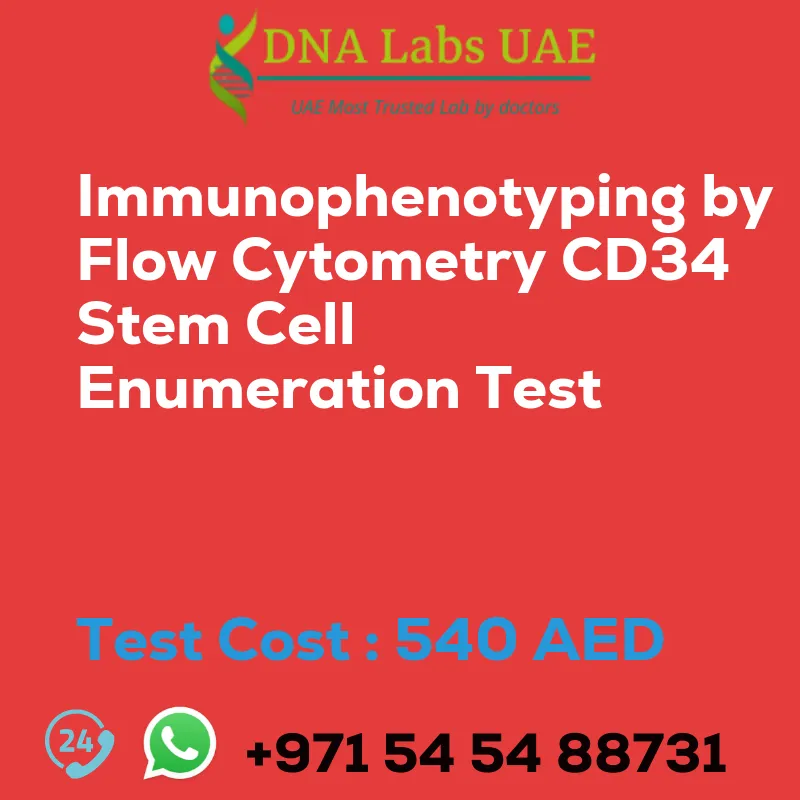IMMUNOPHENOTYPING BY FLOW CYTOMETRY CD34 STEM CELL ENUMERATION Test
Test Cost: AED 540.0
Test Components:
- 3 mL (2 mL min.) whole blood in 1 Lavender Top (EDTA) tube
- 3 mL (2 mL min.) whole blood in 1 Green Top (Sodium Heparin) tube OR 2 mL (1 mL min.) Bone marrow in 1 Green Top (Sodium heparin) tube
- 1 mL (0.5 mL min.) Cord blood / Apheresis sample in a sterile screw capped container
Sample Condition: Ship immediately at 18-22°C (whole blood) or 2-8°C (cord blood / apheresis sample). DO NOT FREEZE.
Report Delivery: Sample daily by 9 am; Report same day
Method: Flow Cytometry
Test Type: Cancer, Transplantation Pathology
Doctor: Oncologist, Hematologist
Test Department: FLOW CYTOMETRY
Pre Test Information: Give brief clinical history.
Test Details:
The Immunophenotyping by Flow Cytometry CD34 (Stem Cell) Enumeration test is a laboratory test that measures the number of CD34 positive cells in a sample. CD34 is a cell surface marker that is commonly found on hematopoietic stem cells, which are responsible for the production of all blood cells. This test is often used in the field of stem cell transplantation to determine the number of hematopoietic stem cells present in a sample, such as bone marrow or peripheral blood. The results of this test can help assess the suitability of a donor for transplantation, as well as monitor the engraftment and reconstitution of stem cells after transplantation.
During the test, the sample is stained with fluorescently labeled antibodies that specifically bind to CD34 positive cells. The stained sample is then analyzed using a flow cytometer, which can detect and quantify the fluorescence emitted by each cell. By measuring the number of CD34 positive cells in the sample, the test provides an estimation of the stem cell content.
The Immunophenotyping by Flow Cytometry CD34 Enumeration test is a valuable tool in the field of stem cell transplantation, allowing for the assessment and monitoring of stem cell populations. It is typically performed by trained laboratory professionals in specialized laboratories.
| Test Name | IMMUNOPHENOTYPING BY FLOW CYTOMETRY CD34 STEM CELL ENUMERATION Test |
|---|---|
| Components | |
| Price | 540.0 AED |
| Sample Condition | 3 mL (2 mL min.) whole blood in 1 Lavender Top (EDTA) tubeAND 3 mL (2 mL min.) whole blood in 1 Green Top (Sodium Heparin) tube OR 2 mL (1 mL min.) Bone marrow in 1 Green Top (Sodium heparin) tube. Ship immediately at 18\u0192??22?\u00f8C OR 1 mL (0.5 mL min.) Cord blood \/ Apheresis sample in a sterile screw capped container. Ship immediately at 2\u0192??8?\u00f8C. DO NOT FREEZE. Specify time, date and clinical details on test request form. |
| Report Delivery | Sample Daily by 9 am; Report Same day |
| Method | Flow Cytometry |
| Test type | Cancer, Transplantation patholgy |
| Doctor | Oncologist, Hematologist |
| Test Department: | FLOW CYTOMETRY |
| Pre Test Information | Give brief clinical history. |
| Test Details |
The Immunophenotyping by Flow Cytometry CD34 (Stem Cell) Enumeration test is a laboratory test that measures the number of CD34 positive cells in a sample. CD34 is a cell surface marker that is commonly found on hematopoietic stem cells, which are responsible for the production of all blood cells. This test is often used in the field of stem cell transplantation to determine the number of hematopoietic stem cells present in a sample, such as bone marrow or peripheral blood. The results of this test can help assess the suitability of a donor for transplantation, as well as monitor the engraftment and reconstitution of stem cells after transplantation. During the test, the sample is stained with fluorescently labeled antibodies that specifically bind to CD34 positive cells. The stained sample is then analyzed using a flow cytometer, which can detect and quantify the fluorescence emitted by each cell. By measuring the number of CD34 positive cells in the sample, the test provides an estimation of the stem cell content. The Immunophenotyping by Flow Cytometry CD34 Enumeration test is a valuable tool in the field of stem cell transplantation, allowing for the assessment and monitoring of stem cell populations. It is typically performed by trained laboratory professionals in specialized laboratories. |







